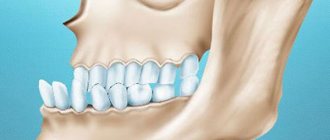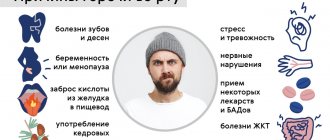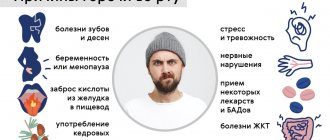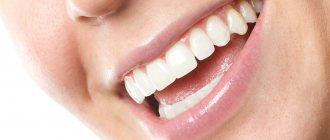Many people feel the taste of bitterness in the mouth, especially in older age, when various chronic diseases are acquired. The main causes of bitterness in the mouth after eating include diseases of the gastrointestinal tract, oral cavity, liver and gall bladder.
In rare cases, a bitter taste is a side effect of various medications or eating any foods, for example, fatty, fried, processed foods. These sensations are temporary and disappear after their cause is eliminated. The constant bitter taste sensation must be taken seriously.
Causes
Bitterness in the mouth after eating is a rather unpleasant symptom.
Depending on the circumstances and with what frequency bitterness in the mouth occurs, the etiology of this symptom can be assumed:
- Every morning you feel bitterness - this is a symptom of liver failure or gallbladder disease.
- After physical activity - liver disease.
- After eating - diseases of the stomach, intestines and gall bladder.
- When eating fatty or fried foods, diseases of the gallbladder, liver and bile ducts occur.
- Constant causeless bitterness is a symptom of cholecystitis, cholelithiasis, endocrine or psychological disorders, as well as cancer of the stomach, esophagus or intestines.
- Rare and quickly passing sensations of bitterness are the consequences of taking medications or stress.
Other symptoms
It is worth noting! In addition to the immediate manifestation in the form of the smell of eggs from the mouth, the patient may experience the following list of symptoms:
- the appearance of nausea and heaviness in the stomach ;
- bloating ;
- the phenomenon of constipation or diarrhea ;
- bouts of vomiting ;
- pronounced pain in the stomach ;
- feeling of fullness in the stomach.
Depending on the accompanying symptoms, it is possible to identify the pathology developing in the body.
It's all about the bile
How does bitterness in the mouth occur after eating? Thanks to the functioning of the liver, fats are broken down into food components that are easily digested. In this case, bile is released into the duct and emulsifies fats into particles. In cases of pathological processes, bile stagnates in the canal and is released into the esophagus. Bile also accumulates in the gallbladder. Due to this, a bitter taste appears in the mouth.
The cause of bile stagnation can be various diseases of the gastrointestinal tract, including inflammatory and infectious ones. In this case, bile enters the gastrointestinal canal in an amount that is not enough for the complete processing of all food.
Also, in this case, intestinal motility disorders occur, and as a result, stagnation of the digestive process. Undigested food is retained in the intestines, and rotting processes begin - this causes changes in taste sensations and the appearance of a bitter taste. A bitter taste in the mouth after eating food can be a symptom of the following diseases:
- Cholecystitis
- Jaundice
- Pancreatitis
- Colitis
- Gastroesophageal reflux disease
- Dyskenesia
Cholecystitis
Cholecystitis is an inflammation of the gallbladder. This disease is accompanied by bitterness in the mouth, heartburn, pain in the right side, and dry mouth. During the acute form of the disease, the temperature rises and vomiting, stool disturbances and the formation of a white coating on the tongue are possible.
Gastroesophageal reflux disease
Bitterness in the mouth after eating as an alarm signal
During this disease, there is an active release of gastric juice into the esophagus, sometimes so intensely that it reaches the esophagus and mouth. Therefore, it is not surprising to feel bitterness after eating. Such emissions usually occur due to overeating, abuse of fatty and fried or spicy foods.
Is it possible to determine the cause of a burning sensation in the mouth based on symptoms?
The reasons why the oral cavity burns can only be determined by a doctor. Given the wide range of diseases and conditions in which such a symptom is possible, independent determination of the root cause often leads to false conclusions.
However, for some combinations of symptoms, the underlying cause can be determined with a high degree of probability. Let's consider several of these options:
- Severe burning sensation in the mouth – glossitis, stomatitis, anemia or menopause.
- Burning sensation and abundant white coating – candidiasis (thrush).
- Burning palate - viral or bacterial pathologies of the oral cavity, mental disorders, injuries or burns.
- Burning sensation with dry mouth – disruption of the salivary glands, diabetes mellitus, taking antibiotics or diuretics.
- Burning in the gums – gum pathology (gingivitis, periodontal disease).
- Burning tongue with a sour taste – gastrointestinal diseases (gastritis, gastric ulcer).
Other reasons
A bitter taste in the mouth can also be felt for reasons not related to diseases of the gastrointestinal tract. These reasons include:
- Hormonal disorders
- Gingivitis
- Periodontitis
- Diabetes
- Taste disorders
- Oral diseases
Inflammatory diseases of the oral cavity, untreated caries and pulpitis, periodontitis and gingivitis can often be accompanied by bitterness after eating. This is due to the processes of decay in the mouth, inside the tooth or gum. During inflammation, many pathogenic microorganisms appear in the oral cavity; as a result of their reproduction and the spread of their waste products, bad breath and bitterness appear.
Taste disorders
With this disease, disruptions in the functioning of taste buds located in the palate and tongue occur. Many people suffering from this disease feel bitterness all the time. Elderly people, whose number of taste buds are significantly reduced, are susceptible to this disease.
Hormonal disorders
Diseases of the endocrine system are accompanied by hormonal disorders. If they are associated with a malfunction of the thyroid gland, an increased amount of secretion is released. As a result, adrenaline is released. This hormone can provoke muscle spasms of the biliary tract, after which dyskinesia occurs and, as a result, bitterness in the mouth.
Pregnancy
During pregnancy, heartburn and a bitter taste in the mouth occur quite often. The reason for this is the increased growth of the uterus and its pressure on neighboring organs, including the stomach and gall bladder.
Side effect after taking medication
Many antibiotics, antihistamines and antifungals increase the load on the liver. Therefore, after taking them, quite often a feeling of bitterness and other unpleasant symptoms occur in the mouth. Even many phytomedicines, for example, St. John's wort and boron uterus, have an effect on the functioning of the liver. After stopping taking these medications, the unpleasant symptom disappears without a trace.
“Even people smell bad.” How to live with parosmia after Covid
Tatyana lives in the Moscow region. When she was expecting her third child, five months pregnant, she fell ill with coronavirus. She lost her sense of smell. “At first this made me happy, because I was too sensitive to smells, for example, I couldn’t travel on public transport,” recalls Tatyana. “But, of course, it was hard in everyday life: I almost fed the children rotten soup.” A month after giving birth, the situation changed, the smells began to return to me. But they were not the same as before: everything smelled of something chemical, rotten meat and some odors that did not even exist in nature. I remember the moment where it all started. At night I smelled a strong smell of rubber. At first I thought that he appeared because of a children's cheesecake, which they use to ride down the slide; it was standing in our hallway. We took the cheesecake out onto the balcony, but the smell did not disappear. And no one felt it except me. Then an unpleasant, sickly-sweet smell began to emanate from my hair. I put them in a bun, but it didn't help. Then I began to smell the same smell from the products. As a result, I stopped cooking and eating normally for a while. She saved herself by delivering ready-made food for her family, and for a month and a half she ate oatmeal and honey cake, took vitamins to smooth out the imbalance of nutrients, but her skin still broke out in acne. In the end, I began to smell an unpleasant odor even from people, and tried not to let anyone into my room. When I got hysterical because of this, I started googling what it even was. My husband believed that parosmia exists only when I sent him an article about it.”
Tatyana went to the doctor, but he did not solve the problem. However, she is now making progress for the better. “The doctors didn’t really help me: someone didn’t understand my problem, one doctor recommended a drug to improve cerebral circulation, but it didn’t help me. Now I’m seeing slight progress for the better - I’ve started eating potatoes,” shares Tatyana.
Collage: Anna Sbitneva
“Among the smell disorders with Covid-19 in clinical practice, we most often encounter anosmia (complete absence of smell) and hyposmia (its significant decrease), explains Alexey Yakovlev, Candidate of Medical Sciences, Director of the Association for the Development of Rehabilitation, Physiotherapy and Habilitation. — Parosmia — distortion of odors — is somewhat less common with Covid-19. Like other smell disorders, parosmia develops due to the ability of a virus to penetrate nerve cells and cause so-called “neuroinflammation” - this is called neurotropism of the virus. As a rule, smell disturbances with Covid-19 are short-lived and do not require the use of any specific additional therapy. On average, smell disturbances develop on days 3–5 of the disease and persist during the first 8–14 days of the disease. Most patients note complete restoration of olfactory function by the time the virus is eliminated from the body. However, if olfactory dysfunction persists after the patient receives the first negative PCR smears, this is always a reason to contact specialists - a neurologist and an otorhinolaryngologist.” Yakovlev says that disturbances in the sense of smell are not always related to how seriously ill a person was. However, “it is known that vaccinated patients, in case of illness, suffer from Covid-19 in a milder form, i.e., any manifestations of the disease are less pronounced, the same applies to dysfunction of the olfactory analyzer.”
Alexey Yakovlev. Collage: Anna Sbitneva
“The duration of the violation depends on the severity of the damage. Within 6 months, 95% of patients regain their sense of smell. The taste usually returns to normal much sooner. Doctors have encountered post-viral anosmia before (with rhinovirus, adenovirus infections, parainfluenza), but much less frequently, says otolaryngologist, Ph.D. Anastasia Varvyanskaya. - There is no method that would instantly cure. You should consult a doctor if your sense of smell persists for a month or if you are bothered by a runny nose, nasal congestion, or pain. The doctor conducts an endoscopic examination of the nasal cavity, assesses olfactory and gustatory function. Depending on the situation, he may prescribe additional examination and treatment.”
Anastasia Varvyanskaya. Collage: Anna Sbitneva
“To date, there are no approved treatment regimens for persistent impairment of smell in patients who are convalescents of the new coronavirus infection Covid-19; treatment is always symptomatic and strictly personalized. But smell disorders can be a consequence of other diseases and pathologies, some of which are very serious. Among the neurological diseases in which a violation of the sense of smell may be one of the first symptoms, Parkinson's disease, Alzheimer's disease, dementia with Lewy bodies, and brain tumors should be highlighted. All these pathologies require quite serious professional diagnostics,” Yakovlev points out.
“I got sick in July - I was very weak, I couldn’t get up, I was practically crawling around the apartment, and I had a severe headache,” says Anna, another person who recovered from coronavirus. — When everything passed, there were signs of disturbances in the sense of smell and taste when I ate eggs, but then the smell was even more or less normal. And just three weeks ago, active manifestations began: the smells of meat, onions and eggs changed. From these products I smell a pungent smell of rotten meat, which is generally intolerable. While I have not tried treatment, I hope that it will somehow go away on its own. At first I endured it, ate these foods through force, I just couldn’t believe that I would never be able to feel their previous taste and that it would now be so unpleasant. Then I realized that this couldn’t continue like this and I just had to eliminate these foods from my diet. Although these foods are my favorites, I used to simply not do without them, I ate them every day. Now you have to change your menu. I haven’t felt any better yet, but that’s because the problem with me is recent. I wasn’t particularly afraid of the manifestations of parosmia - it’s unpleasant, of course, that there is such a side effect. I had already heard about this problem, but I didn’t think that I would have it. I tried to “mask” the smell with spices, but I can still smell it all. The smell of the oatmeal has also changed, but for the better - for some reason it has a sweet smell, like it smells like caramel. I used to not like the smell of oatmeal, but now I like it.”
Anna. Collage: Anna Sbitneva
“Food does not become harmful because the brain does not perceive the smell correctly. The main thing is that it is not rotten,” explains the gastroenterologist, Ph.D. Roman Karas. — There is also usually no gastroenterological reason for such symptoms. Because smells are the brain and the nose. But with prolonged parosmia, you limit yourself in the intake of important nutrients, which, of course, will affect your health. Try eating food that smells like rotten fish or feces. Will it work? No. All that remains is to choose products that smell tolerable and avoid parosmia provocateurs. Pleasant taste and smell improve mood, improve appetite and bring joy. With parosmia, the opposite is true: sadness, melancholy, sadness and even weight loss. If you perceive odors incorrectly, you can miss a fire, harmful fumes/gases, a spoiled product, and even lose your job if you are a cook, perfumer, or firefighter. Hygiene difficulties arise."
Roman Karas. Collage: Anna Sbitneva
“Self-medication, which is based on recommendations from the Internet, is a very risky way to restore the sense of smell,” Yakovlev points out. “There are opinions from practicing specialists that neuroprotective therapy and vitamin therapy can speed up the process of restoring the sense of smell, but treatment should always be individual and a treatment plan should be drawn up only with face-to-face interaction between the patient and the doctor.”
Success in treating parosmia also depends on the psychological state of the person. Anxiety, sleep disorders, depression and hypochondriacal disorders can aggravate the symptoms. “The work of the olfactory analyzer is closely related to the work of the centers of the autonomic nervous system, so any psycho-emotional dysfunction that the patient has can contribute to a more pronounced disruption of the olfactory tract, including as part of the development of a syndrome complex of post-Covid disorders (the so-called Long Covid),” says Yakovlev .
“An important role for patients with olfactory impairment is the understanding and support of loved ones, the opportunity to discuss their problem with someone who is in a similar situation, and access to competent sources of information on this problem,” says Varvyanskaya. She also points out that each case of parosmia is individual, and to make a diagnosis you need to consult a doctor: “You need to start with an ENT specialist. The sense of smell can be impaired for various reasons: nasal/sinus disease, acute respiratory viral infections, trauma, neurodegenerative disorders.”
Collage: Anna Sbitneva
Denis, who had coronavirus, had to fight parosmia for about seven months. He was ill in December, and the disturbance in his sense of smell appeared in March. “I noticed the problem by chance when I was eating meat,” says Denis. “I thought it was just spoiled.” But the completely different meat smelled exactly the same the next day. And I realized that there was some problem with me, and not with food. My first thought was that there was something wrong with my nerves or something wrong with my head. I started searching on the Internet to see what it could be, and came across a group on the social network VKontakte where they discussed that distortions in smells appear after the coronavirus. And so everything fell into place in my head, I realized that all this was because of “corona.” There was no misunderstanding on the part of loved ones. At first they looked at me as if I was a little crazy, but when I explained the situation, everyone took it as normal. No one ever said that I imagined or invented something for myself. The biggest problem for me was the unpredictability of grocery shopping: I didn't know what I could eat and what I couldn't. At first it seemed that everything was simple: I can’t eat dairy, meat, onions, so these foods need to be excluded, everything else should be eaten. But sometimes some foods began to smell unpleasant, from which I did not expect this at all, for example, some vegetable. And it turns out that you simply throw away half of the food at home because you can’t eat it. All purchases were a lottery.” Denis did not go to the clinic because he was not sure that his attending physician could help in this matter.
“This problem itself lasted about seven months, the worst were the first two, when everything really stinks, from milk to soy meat, everything that contains protein, lactose,” recalls Denis. “Then the range of products expanded. Somewhere in the middle of summer I started drinking milk, it no longer had a strong smell. And gradually, over two months, the [unpleasant] smell disappeared completely. It’s the same story with meat: at first I only ate fish and sausage, and then I started eating pork, although chicken and beef still smelled bad. I started eating chicken normally in September. The recovery was not abrupt - it took me about four months. If there was no information about parosmia (and when I started, there was little information), then it would be absolutely terrible to walk around and think that there is something wrong with your head. And just not knowing what to do, whether the distortion of smells will ever go away, it would be very psychologically difficult. And when I found information, read the stories of people who had experienced this, it was somehow easier to accept.”
Illustrations: Anna Sbitneva
What to do?
Bitterness in the mouth after eating can be eliminated in various ways.
So, there are quite a few causes of bitterness in the mouth and it is impossible to determine the exact etiology from just one or a few symptoms. In order to get rid of this unpleasant feeling, you need to undergo a full examination, including:
- Ultrasound
- Gastroscopy
- Colonoscopy
- Laboratory diagnostics
- Computed tomography
- MRI
Choosing the right research and treatment is impossible without consulting a gastroenterologist, therapist, or neurologist.
Diagnostic measures
Before starting a course of treatment and getting rid of an unpleasant symptom, you need to undergo a diagnosis.
Keep in mind! The set of diagnostic measures includes the following:
- General and biochemical blood test. With its help, the presence or absence of an inflammatory process in organs and tissues is revealed, and internal bleeding is excluded;
- stool analysis. Determine the presence of parasites and intestinal infections in the body;
- Ultrasound. During the examination, the structure and size of the internal organs are visible, which makes it possible to determine deviations;
- determination of the acidity of gastric juice. The probing method is used for research, in which secretions are taken or the PH metric method;
- fibrogastroduodenoscopy. The method is aimed at identifying more detailed information about the quality indicators of the mucous membrane of the stomach and intestines;
- CT.
How to reduce bitterness in your mouth
You can get rid of the feeling of bitterness in your mouth only after treating the disease of which it is a symptom. To alleviate the condition, you need to reconsider your diet: do not eat fried, fatty, salty and smoked foods, switch to foods of plant origin. You should avoid stress, take soothing herbal infusions, and exercise.
A feeling of bitterness may occur due to the formation of toxins in the body. Therefore, it is necessary to treat the intestines. Cleansing enemas and taking enterosorbents will help, which not only cleanse the body of toxins, but also relieve constipation and ensure regular bowel movements. To cleanse the body, you need to drink plenty of clean water every day.
Treatment for burning sensation in the mouth
First of all, you need to find out the cause of the burning sensation in the mouth. If the problem is related to diseases and conditions of the oral cavity and teeth, then in the dental clinic the patient is given one or more of the following measures:
- Professional teeth cleaning – removal of plaque, stone, sanitation of the oral cavity.
- Treatment of dental diseases - caries, pulpitis.
- Treatment of gum diseases – gingivitis, periodontitis.
- Assessment of the condition of dentures and their effect on the oral mucosa. If necessary, prosthetic structures are replaced.
In addition to the above procedures, therapeutic measures for burning in the mouth also include taking anti-inflammatory, antibacterial or antifungal (for candidiasis) drugs. If there is a lack of vitamins and minerals, a course is prescribed to replenish the missing biologically active substances. Some patients are prescribed physical therapy.
Folk remedies
Bitterness in the mouth may be due to medication
In cases where no serious pathologies are found, folk recipes will help get rid of the feeling of bitterness in the mouth.
- Flax seed. To prepare the drink, take a quarter cup of ground flaxseed, add half a liter of boiled water and leave. Drink half a glass in the morning.
- Vegetable juices. Freshly squeezed juices from potatoes, carrots and celery increase the secretion of saliva and thereby help with bitterness in the mouth.
- Decoction of calendula flowers. For half a liter of boiling water you need to take 20 grams of calendula flowers, bring to a boil and leave. It is recommended to take 2 glasses per day for a month.
- Sunflower oil. Keep the slightly heated oil in your mouth for several minutes. The feeling of bitterness should disappear.
- Corn silk. A decoction of corn silk has choleretic properties, it contains fiber, B vitamins, and vitamin E. It helps cleanse the body, get rid of bad breath and stimulate the production of digestive enzymes.
- Rose hip decoction. Rosehip decoction is a choleretic agent and a real vitamin bomb. This drink not only relieves the feeling of bitterness in the mouth after eating, it also stimulates the immune system.
The choice of treatment for bitterness in the mouth depends on the disease that caused this sensation. No matter how harmless this symptom may seem, the cause of its occurrence can be quite serious, so you should not neglect this signal from the body and listen to it: get examined and begin treatment.
Treatment and elimination of symptoms
A set of therapeutic measures is selected depending on the pathology after diagnostic procedures .
It is worth noting! The goal of treatment is not only to eliminate the symptom itself. First of all, it is important to get rid of the pathology that caused the taste of eggs in the mouth.
Medications
As for medications , the following drugs are used depending on the disease:
- for dysbiosis, medications from the class of probiotics are used , for example, such as Hilak Forte and Linex;
- in situations with constipation, laxatives are used (they must be prescribed by a doctor), as well as enemas with olive or vaseline oil ;
- if the cause of bad breath is a lack of digestive enzymes Mezim Forte and Festal are taken ;
- the process of producing bile in the body , then Allochol or Holosas ;
- for stomach ulcers or gastritis, Almagel and analogues are used ;
- if there is a bacterial infection , then you will need to take a course of Amoxicillin and Phthalazol ;
- if there are parasites use Levamisole, Metronidazole and other similar drugs.
Important! Under no circumstances should you self-medicate if you have a smell of rotten eggs coming from your mouth. Medicines are prescribed only by a doctor after proper diagnosis.
Diet
It happens that the taste of rotten eggs in the mouth appears due to food poisoning. In such a situation, to get rid of the symptom you will need to do a gastric lavage.
In order to provoke a gag reflex, you can prepare a weak solution of soda and drink it in small sips.
After gastric lavage, you need to take any sorbent.
As for directly eliminating the symptom , you can get rid of it yourself at home.
First of all , you should pay attention to the daily menu and adjust your diet. Low acidity is eliminated by consuming :
- fermented milk products;
- meat;
- fish;
- vegetables You can make a beet or turnip salad.
Keep in mind! To eliminate the symptom, you need to exclude the following foods from your diet:
- alcoholic products;
- citrus;
- plums, cherries;
- legumes;
- milk products;
- cabbage, squash, zucchini;
- bread.
When the smell of rotten eggs appears in the mouth, eat food 5 times a day in small portions. strictly not recommended to fast for “accumulation of acid”, as well as to overeat.
Folk recipes
You should know! At home, you can use the following methods to get rid of the smell of rotten eggs from your mouth:
- herbal decoctions (melissa, chamomile, yarrow). Infusions of raspberry leaves, rosehip or sea buckthorn, as well as St. John's wort and lingonberry, give a good effect. These herbs can be purchased at the pharmacy and prepared according to the attached instructions, or 1/2 teaspoon of herbal raw materials, pour 300 ml of boiling water and leave for 15 minutes;
- take general strengthening agents, for example, vitamin-mineral complexes . It is useful in such a situation to drink mineral water;
- soda solution. To quickly get rid of an uncomfortable symptom, you will need to prepare a weak soda solution. Dilute 1/2 teaspoon of the substance in 250 ml of water and drink in small quantities when hydrogen sulfide belching occurs;
- eggshell. For this remedy, you will need to boil the eggs for 20 minutes, peel them, remove the film from the shell and grind the shell into powder. Take 1/2 teaspoon three times a day. The product should be washed down with clean water;
- mint tincture. The product can be purchased at a pharmacy and taken 15-20 drops with meals.
Useful video
From this video you will learn what to do if you have an unpleasant taste in your mouth:
If a hydrogen sulfide taste appears in your mouth, you need to determine the cause of this phenomenon as soon as possible . If there is a suspicion of the development of pathology, then only a qualified doctor can cope with it.
You should not resort to home remedies or self-medicate. Since with their help you can only eliminate the symptom, and not the disease itself. This can lead to negative consequences and complications.









